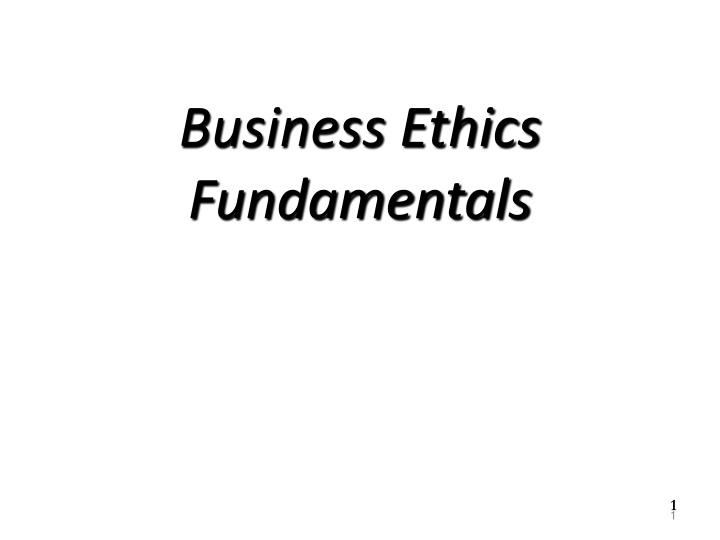
Business Ethics Fundamentals and Ethical Dilemmas
Explore the core values, ethical reasoning, and inventory of ethical issues in business through a comprehensive overview of business ethics fundamentals. Delve into the importance of ethical decision-making and the evolution of business ethics over time.
Download Presentation

Please find below an Image/Link to download the presentation.
The content on the website is provided AS IS for your information and personal use only. It may not be sold, licensed, or shared on other websites without obtaining consent from the author. If you encounter any issues during the download, it is possible that the publisher has removed the file from their server.
You are allowed to download the files provided on this website for personal or commercial use, subject to the condition that they are used lawfully. All files are the property of their respective owners.
The content on the website is provided AS IS for your information and personal use only. It may not be sold, licensed, or shared on other websites without obtaining consent from the author.
E N D
Presentation Transcript
Business Ethics Fundamentals 11
Ethical Dilemma Ethics grey area Law 2
Asking Key Questions 1. What are my core values and beliefs? 2. What are the core values and beliefs of my organization? 3. Whose values, beliefs and interests may be at risk in this decision, and Why? 4. Who will be harmed or helped by my decision or the decision of the organization? 5. How will I, and my organization be affected by the decision? 3
Why use Ethical reasoning in business? 1. Many times laws do not cover all aspects or grey areas of a problem EXAMPLES 2. Free-market and regulated-market mechanisms do not inform owners/ managers how to respond to far reaching ethical consequences. EXAMPLES 3. Many complex moral problems require an intuitive/ learned understanding of fairness, justice to the community. EXAMPLES 4
Inventory of Ethical Issues in Business Employer-Employee Relations Company-Customer Relations Company-Shareholder Relations Company-Community/Public Interest 5
Business Ethics: What Does It Really Mean? Business Ethics:Today vs. Earlier Period Society s Expectations of Business Ethics Ethical Problem Actual Business Ethics Ethical Problem 1950s Time Early 2000s 6
Business Ethics: What Does It Really Mean? Definitions Ethics involves a discipline that examines good or bad practices within the context of a moral duty Moral conduct is behavior that is right or wrong Business ethics include practices and behaviors that are good or bad 7
Business Ethics: What Does It Really Mean? Two Key Branches of Ethics Descriptive ethics How people behave and what sort of moral standards they claim to follow. What is true and factual. Normative ethics involves supplying and justifying moral systems What should be 8
Conventional Approach to Business Ethics Conventional approach to business ethics involves a comparison of a decision or practice to prevailing societal norms Pitfall: ethical relativism Decision or Practice Prevailing Norms 9
Sources of Ethical Norms Regions of Country Fellow Workers Fellow Workers Family Profession The Individual Conscience Friends Employer Religious Beliefs The Law Society at Large 10
Four Important Ethical Questions What is? What ought to be? How do we get from what is to what ought to be? What is our motivation for acting ethically? 12
3 Models of Management Ethics 1. Immoral Management A style devoid of ethical principles and active opposition to what is ethical. 2. Moral Management Conforms to high standards of ethical behavior. 3. Amoral Management Intentional - does not consider ethical factors Unintentional - casual or careless about ethical considerations in business 13
3 Models of Management Ethics Three Types Of Management Ethics Moral Amoral Immoral 14
Moral Management Models and Acceptable Stakeholder Thinking 6-20
Developing Moral Judgment External Sources of a Manager s Values Religious values Philosophical values Cultural values Legal values Professional values 19
Developing Moral Judgment Internal Sources of a Manager s Values Respect for the authority structure Loyalty Conformity Performance Results 20
Elements of Moral Judgment Moral imagination Moral identification and ordering Moral evaluation Tolerance of moral disagreement and ambiguity Integration of managerial and moral competence A sense of moral obligation 21






















